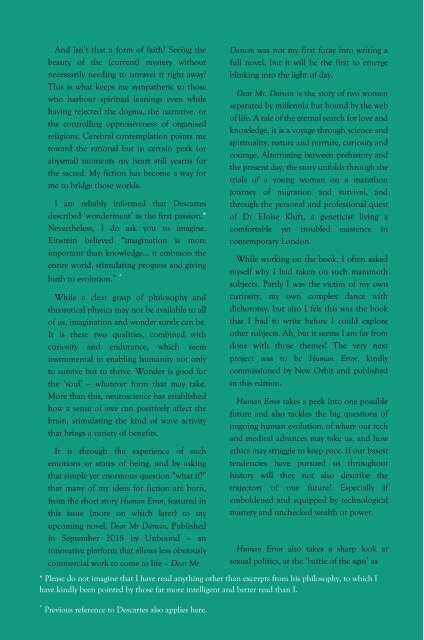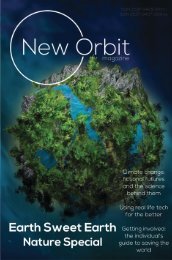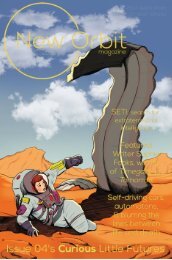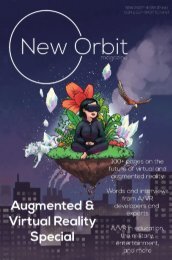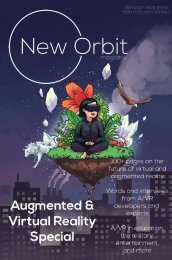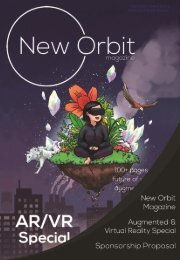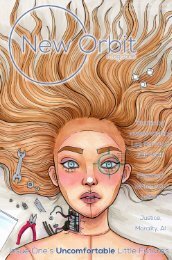New Orbit Magazine Online: Issue 03, June 2018
You also want an ePaper? Increase the reach of your titles
YUMPU automatically turns print PDFs into web optimized ePapers that Google loves.
And isn’t that a form of faith? Seeing the<br />
beauty of the (current) mystery without<br />
necessarily needing to unravel it right away?<br />
This is what keeps me sympathetic to those<br />
who harbour spiritual leanings even while<br />
having rejected the dogma, the narrative, or<br />
the controlling oppressiveness of organised<br />
religions. Cerebral contemplation points me<br />
toward the rational but in certain peak (or<br />
abysmal) moments my heart still yearns for<br />
the sacred. My fiction has become a way for<br />
me to bridge those worlds.<br />
I am reliably informed that Descartes<br />
described ‘wonderment’ as the first passion.*<br />
Nevertheless, I do ask you to imagine.<br />
Einstein believed “imagination is more<br />
important than knowledge… it embraces the<br />
entire world, stimulating progress and giving<br />
birth to evolution.” +<br />
While a clear grasp of philosophy and<br />
theoretical physics may not be available to all<br />
of us, imagination and wonder surely can be.<br />
It is these two qualities, combined with<br />
curiosity and endurance, which seem<br />
instrumental in enabling humanity not only<br />
to survive but to thrive. Wonder is good for<br />
the ‘soul’ – whatever form that may take.<br />
More than this, neuroscience has established<br />
how a sense of awe can positively affect the<br />
brain, stimulating the kind of wave activity<br />
that brings a variety of benefits.<br />
It is through the experience of such<br />
emotions or states of being, and by asking<br />
that simple yet enormous question “what if?”<br />
that many of my ideas for fiction are born,<br />
from the short story Human Error, featured in<br />
this issue (more on which later) to my<br />
upcoming novel, Dear Mr Darwin. Published<br />
in September <strong>2018</strong> by Unbound – an<br />
innovative platform that allows less obviously<br />
commercial work to come to life – Dear Mr<br />
Darwin was not my first foray into writing a<br />
full novel, but it will be the first to emerge<br />
blinking into the light of day.<br />
Dear Mr. Darwin is the story of two women<br />
separated by millennia but bound by the web<br />
of life. A tale of the eternal search for love and<br />
knowledge, it is a voyage through science and<br />
spirituality, nature and nurture, curiosity and<br />
courage. Alternating between prehistory and<br />
the present day, the story unfolds through the<br />
trials of a young woman on a marathon<br />
journey of migration and survival, and<br />
through the personal and professional quest<br />
of Dr Eloise Kluft, a geneticist living a<br />
comfortable yet troubled existence in<br />
contemporary London.<br />
While working on the book, I often asked<br />
myself why I had taken on such mammoth<br />
subjects. Partly I was the victim of my own<br />
curiosity, my own complex dance with<br />
dichotomy, but also I felt this was the book<br />
that I had to write before I could explore<br />
other subjects. Ah, but it seems I am far from<br />
done with those themes! The very next<br />
project was to be Human Error, kindly<br />
commissioned by <strong>New</strong> <strong>Orbit</strong> and published<br />
in this edition.<br />
Human Error takes a peek into one possible<br />
future and also tackles the big questions of<br />
ongoing human evolution, of where our tech<br />
and medical advances may take us, and how<br />
ethics may struggle to keep pace. If our basest<br />
tendencies have pursued us throughout<br />
history will they not also describe the<br />
trajectory of our future? Especially if<br />
emboldened and equipped by technological<br />
mastery and unchecked wealth or power.<br />
Human Error also takes a sharp look at<br />
sexual politics, at the ‘battle of the ages’ as<br />
* Please do not imagine that I have read anything other than excerpts from his philosophy, to which I<br />
have kindly been pointed by those far more intelligent and better read than I.<br />
+ Previous reference to Descartes also applies here.


